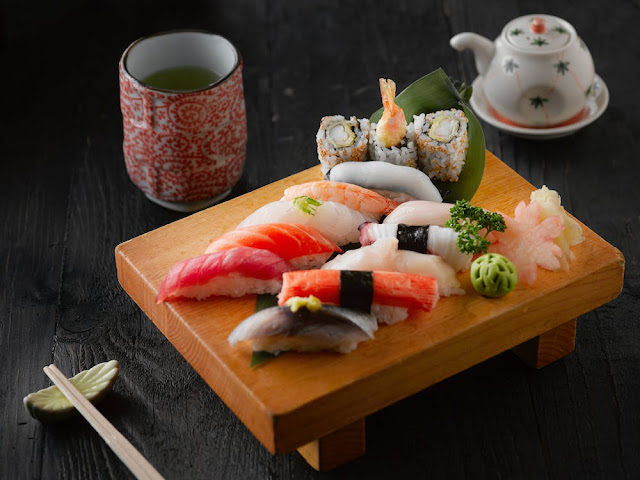 |
| sashimi platters are the mainstay at japanese restaurant, Hong Kong... |
Behind China's ban on Japanese seafood | is about safety. Is it really?
In the bustling roads of Hong Kong's Central district the lunchtime queues snake around the stylish japanese resturants where very good quality sushi can sell at $150 a pop only for a tasting menu.
At Fumi, one of the more well known joints, the floors are loaded with north of 100 individuals prattling endlessly and chowing down.
"It's similarly as occupied as could be expected," says Thomason Ng, Fumi's head supervisor. "Just a little piece of individuals have asked where the food is from. They're hanging around for the feasting experience and extraordinary cordiality close by the food."
The incredible economies of Asia are conflicting over the ocean indeed, yet from the vibe of these clients either no one told them, or they essentially couldn't care less.
The move by Japan, the world's third-biggest economy, to deliver more than 1 million metric lots of treated radioactive waste water from the obliterated Fukushima atomic plant into the ocean has incited an incensed reaction from its neighbor and long-term rival China, the world's second-biggest economy.
 |
| tables were filled at Japanese café Fumi in Hong Kong on August 24, 2023 |
Not long after Japan started siphoning the water into the sea on Thursday, China declared that it would forbid all fish imports from its neighbor - unfathomably broadening prior limitations it had carried out on ocean depths imports from Fukushima prefecture directly following the plant's total implosion in 2011.
Indeed, even as the import boycott kicked in, tables were filled at Japanese café Fumi in Hong Kong on August 24, 2023.
Hours before China's declaration, the Asian monetary focus of Hong Kong - a semi-independent Chinese city - forced its own restriction on oceanic item imports from 10 Japanese districts including Tokyo and Fukushima
Yet, while the all around behaved, worldwide groups populating Hong Kong's sushi joints might have to a great extent disregarded the neighborhood government's admonitions, on the Chinese central area the public's response has been fairly less lenient.
Calls for boycott
Chinese media - conventional and social - has detonated with outrage at Japan's activities, with a few state news sources running basic publications and assessments of public sentiment. A hashtag impacting the delivery acquired than 800 million perspectives on the Chinese web-based entertainment stage Weibo inside only a couple of hours of Thursday's delivery.
China demands the boycott is important "to forestall the gamble of radioactive defilement of food" and has blamed Japan for an "incredibly childish and unreliable demonstration that ignores the global public interest." It has over and again dismissed Japan's cases that the water has been enough treated and contains unimportant measures of radioactivity.
Numerous clients on Chinese virtual entertainment - or possibly the vocal ones - seem to help their administration's situation, while a lot more have approached specialists to go above and beyond with an all the more far reaching blacklist.
"We ought to boycott every single Japanese item," read one top remark on Weibo. "The Japanese are flighty," read another.
Spcialists say the strength of the reaction to a limited extent mirrors the long history of ill will between the two Asian monsters, which traces all the way back to and past The Second Great War and incorporates various oceanic regional questions.
Calls for blacklists of Japan are somewhat continuous, breaking out at whatever point old complaints back their heads or regional debates flare, they bring up.
In 2012, exchange relations sank to a depressed spot when Japan nationalized a gathering of islands in the East China Ocean guaranteed by both Tokyo and Beijing, powering fierce enemy of Japanese fights across urban communities in China. The blacklists transformed into savage assaults against Japanese-claimed or marked manufacturing plants in China as well as automakers and home apparatus retailers.
Hitting where it harms
That degree of poison is absent this time round - or possibly not yet - regardless of whether the boycott seems intended to hit Japan where it harms.
In spite of their severe chronicles, Japanese food is gigantically famous in many pieces of China and business is blasting.
There were 789,000 Japanese eateries in China in 2022, with the area esteemed at around $25 billion and developing. There are more Japanese cafés in China now than there were before the flare-up of the Covid pandemic in 2019.
Those cafés are probably going to be hit hard by the boycott, as are exchange ties all the more for the most part.
Last year, Japan sent out fish worth about $942.4 million (137.7 billion yen) to China - its top exchanging accomplice, while Hong Kong represented another roughly $432.3 million (63.2 billion yen), as per the Japanese government.
Then, at that point, there is the Japanese fishing industry to ponder, with neighborhood angler staggering as far as they tell as unfortunate exposure.
'Not remotely harmful'
Pundits have blamed China and Hong Kong for publicity and twofold guidelines, proposing they are utilizing the issue to score political focuses over a provincial opponent to the detriment of logical thoroughness.
The state-possessed power firm Tokyo Electric Power Organization (TEPCO) brings up that in the years since the 2011 catastrophe the sullied wastewater has been ceaselessly treated to sift through every one of the removable unsafe components and that it will be handled briefly time and profoundly weakened prior to being delivered over a time of many years.
The interaction will eliminate practically all radionuclides from the wastewater, aside from tritium - a normally happening type of hydrogen that is the most vulnerable of all of radioactive isotopes.
Numerous researchers back Tokyo's place that the water being delivered is protected.
In Fukushima, TEPCO says that about 7,800 cubic meters of water containing 1.1 trillion becquerels of tritium will be delivered in the underlying 17-days of delivery.
That is identical to 0.003 grams of tritium - the heaviness of around 10 strands of human hair - said Nigel Imprints, a specialist on radioactive waste and an academic partner at Curtin College in Australia. According to on the other hand, he, there's as of now around 8,400 grams of tritium currently in the Pacific Sea.
Fukushima seawater discharge causes debate
"It's not in any way whatsoever unsafe," Imprints said, adding that individuals are presented to more radiation on a plane flight.
"(Japan's delivery is) totally steady with past training everywhere. There's 60 years worth of logical information of delivering tritium into streams precisely this way and normally at far higher amounts, and nothing has at any point occurred."
Considerably more tritium has been delivered by typically working thermal energy stations into the north Pacific Sea from China, South Korea, and Taiwan, said David Krofcheck, a physical science speaker at the College of Auckland in New Zealand.
"Tritium is delivered normally as a component of our typical natural foundation radiation, and it voyages by means of downpour or waterways into the world's seas. The water discharge is intended to have multiple times less tritium per liter than is suggested for drinking water by the World Wellbeing Association," Krofcheck said.
As per a concentrate by the Japanese government, China's own Fuqing thermal energy station released 52 trillion becquerels of tritium in 2020.
Be that as it may, these conversations are to a great extent missing from China's state media inclusion and on its vigorously edited web.
Various articles attempting to make sense of the science behind the release — including one from a Chinese atomic master who previously worked at an administration connected establishment — have been scoured in the wake of getting forward movement via online entertainment.
A drop in the financial sea?
While certain pundits are blaming China for building up the dangers, there are other people who keep thinking about whether it has misjudged how much influence it eventually has over its neighbor.
While China is Japan's top fish trade market, it represents just 15-20% of Japan's food commodities, and food sends out represent just 1% of Japan's all out trades, said Stefan Angrick, senior financial analyst at Moody's Investigation.
"To place this into setting, even in a 'worst situation imaginable' including a Chinese restriction on all food imports from Japan, the immediate effect on Japanese Gross domestic product would be around 0.04%," Angrick added.
This shouldn't imply that Japan shouldn't need to be concerned. It is. Japanese State head Fumio Kishida has purportedly "emphatically" mentioned by means of political channels that China "quickly topple" the boycott.
Be that as it may, Tokyo might be looking in the wrong place in the event that it figures contentions about the science will influence China.
Fei Xue, a senior expert covering Asia at the Financial specialist Insight Unit (EIU), said the responses of provincial legislatures to Japan's activities have to a great extent mirrored the situation with their political binds with Tokyo.
In any case, Fei too felt that the restrictions from China and Hong Kong would limitedly affect Japanese exchange.
"Fish sends out represented only 0.3% of Japan's all out products trades in 2022, among which shipments to central area China and Hong Kong addressed 35.8% of the aggregate sum. Thusly, in any event, considering the reputational harm for Japanese fish items, Japan's general commodities won't be substantially subverted," Fei said.
So long and gratitude for all the fish
Back in Hong Kong, it stays hard to identify any waiting feeling of one or the other concern or shock at Japan's activities.
Part of the justification for this might be that culinary experts and restaurateurs saw the boycott coming, with Hong Kong specialists implying from the outset of the year that it was not too far off.
Many answered by extending their stock lines, obtaining their fish from providers in Japan's Hokkaido, Kyushu and Kagoshima districts - which are not covered by Hong Kong's restriction - as well as from Norway, Australia and Canada.
Due to that the menu at Fumi hasn't expected to change a lot, with the exception of a little card telling coffee shops that the eatery has followed the new import controls and obtained its fixings from around the world.
At a shopping center close by, burger joint Cara Man, 33, was getting into her lunch at sushi chain Senryo. She said that individuals actually wanted their #1 Japanese dishes, no matter what the news.
"Individuals could begin focusing harder on the radiation levels in their food assuming there are reports of individuals becoming ill, yet that isn't going on the present moment," she said.
"So we'll presumably continue eating Japanese cuisines like nothing happened."



.jpg)
.jpg)


0 Comments